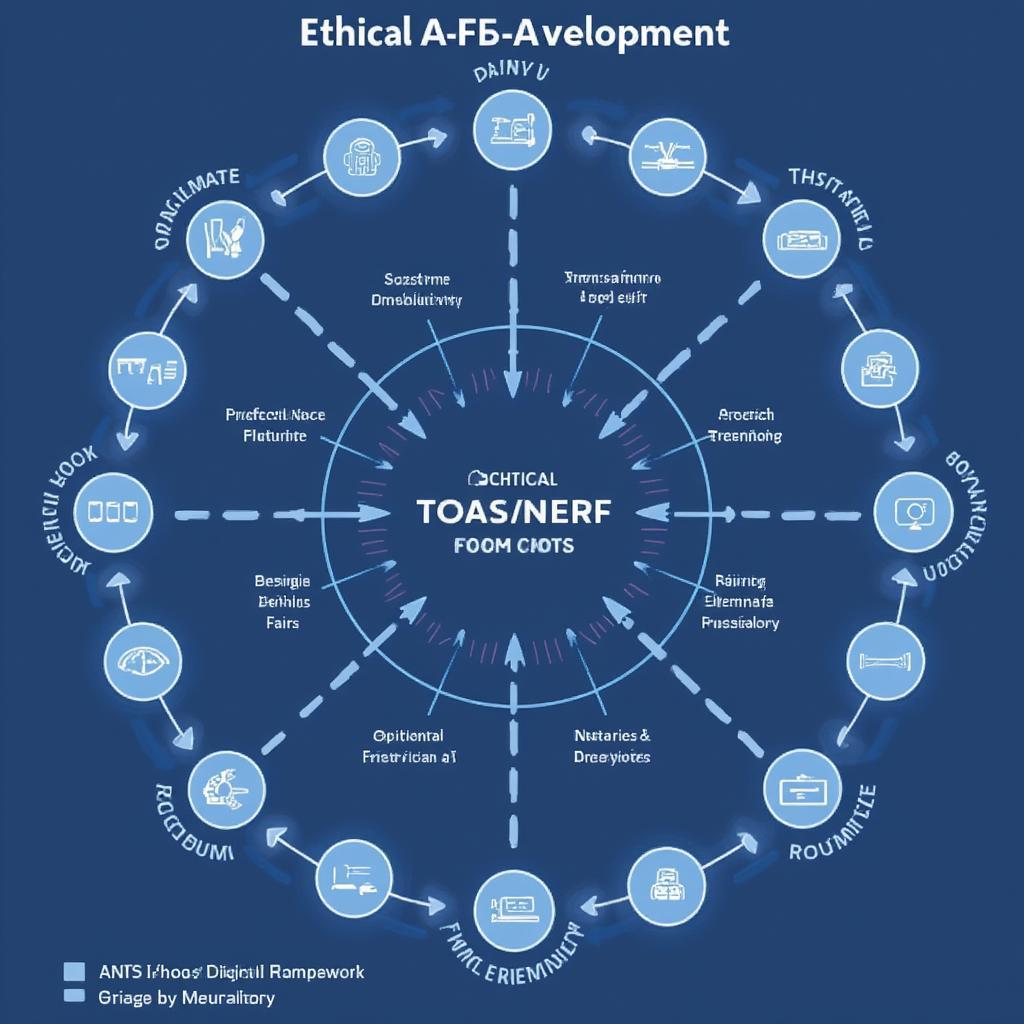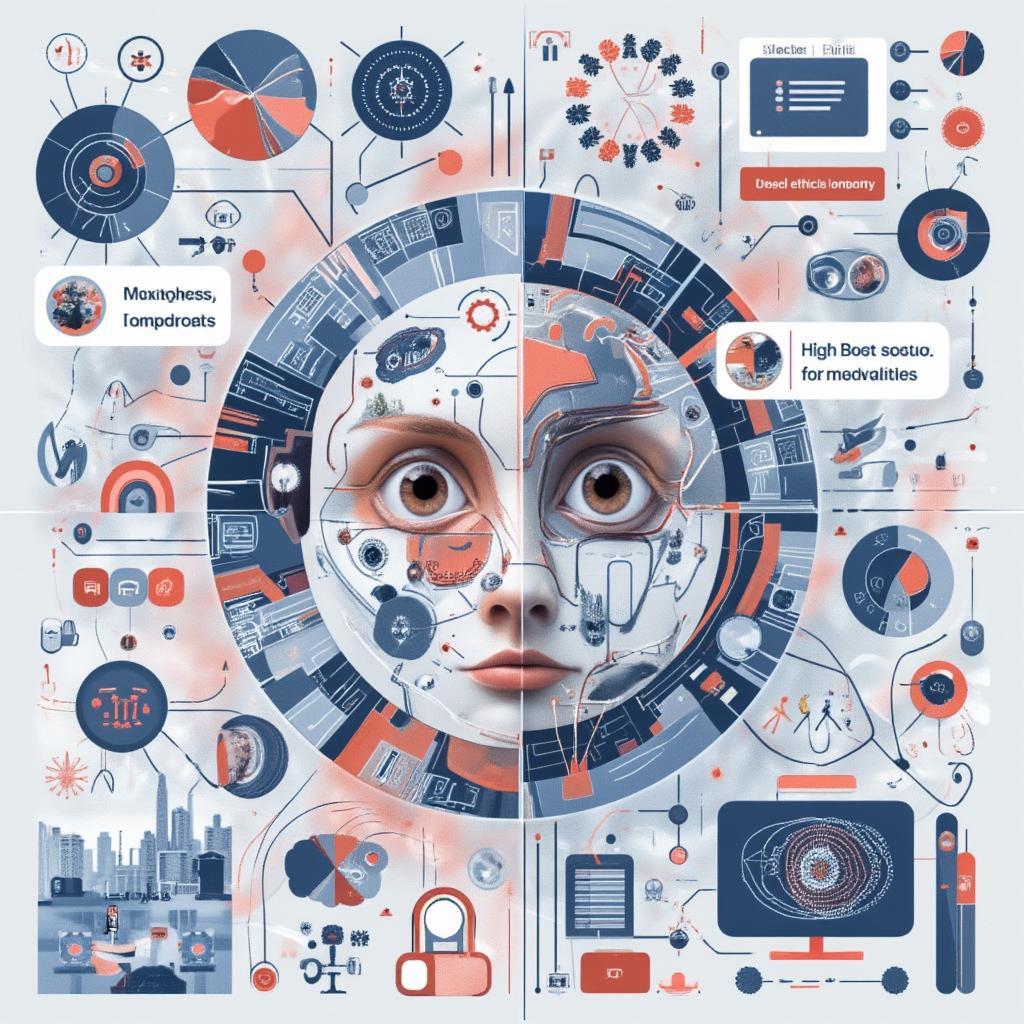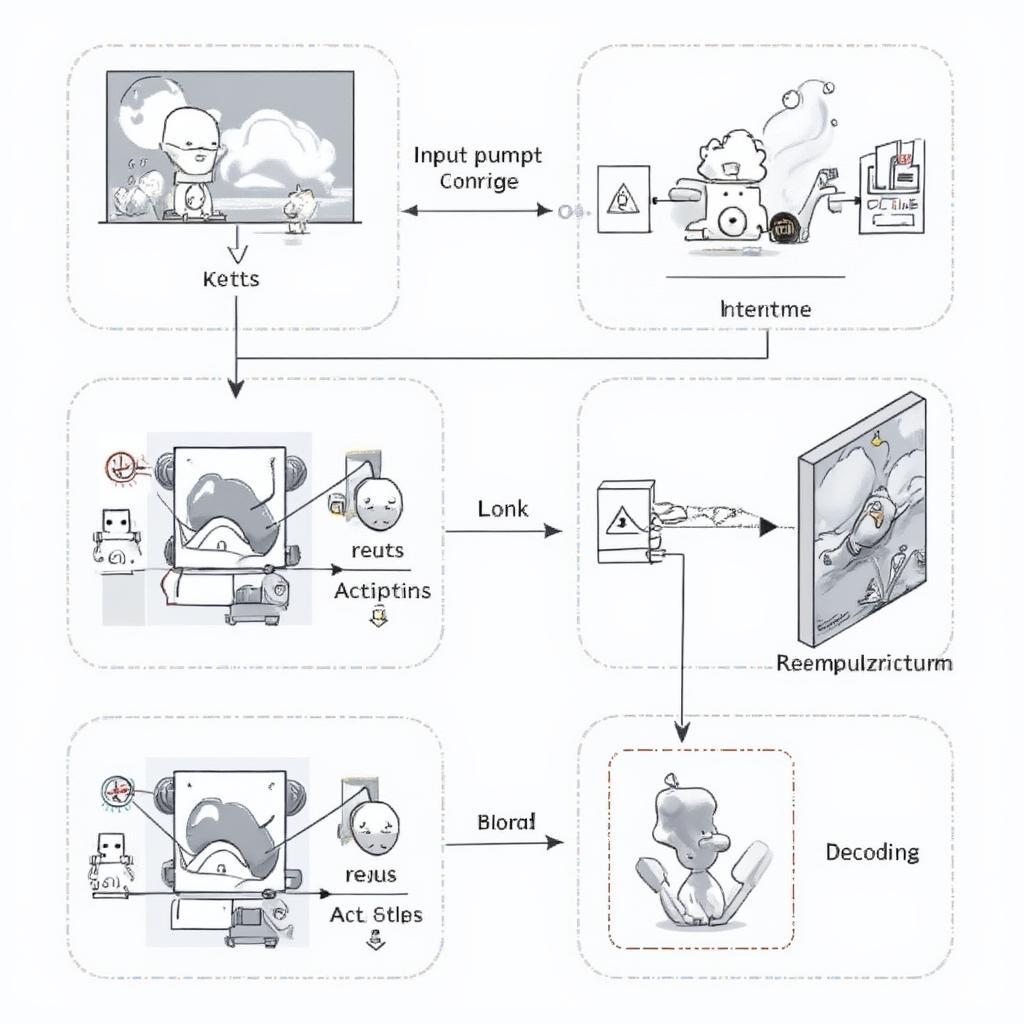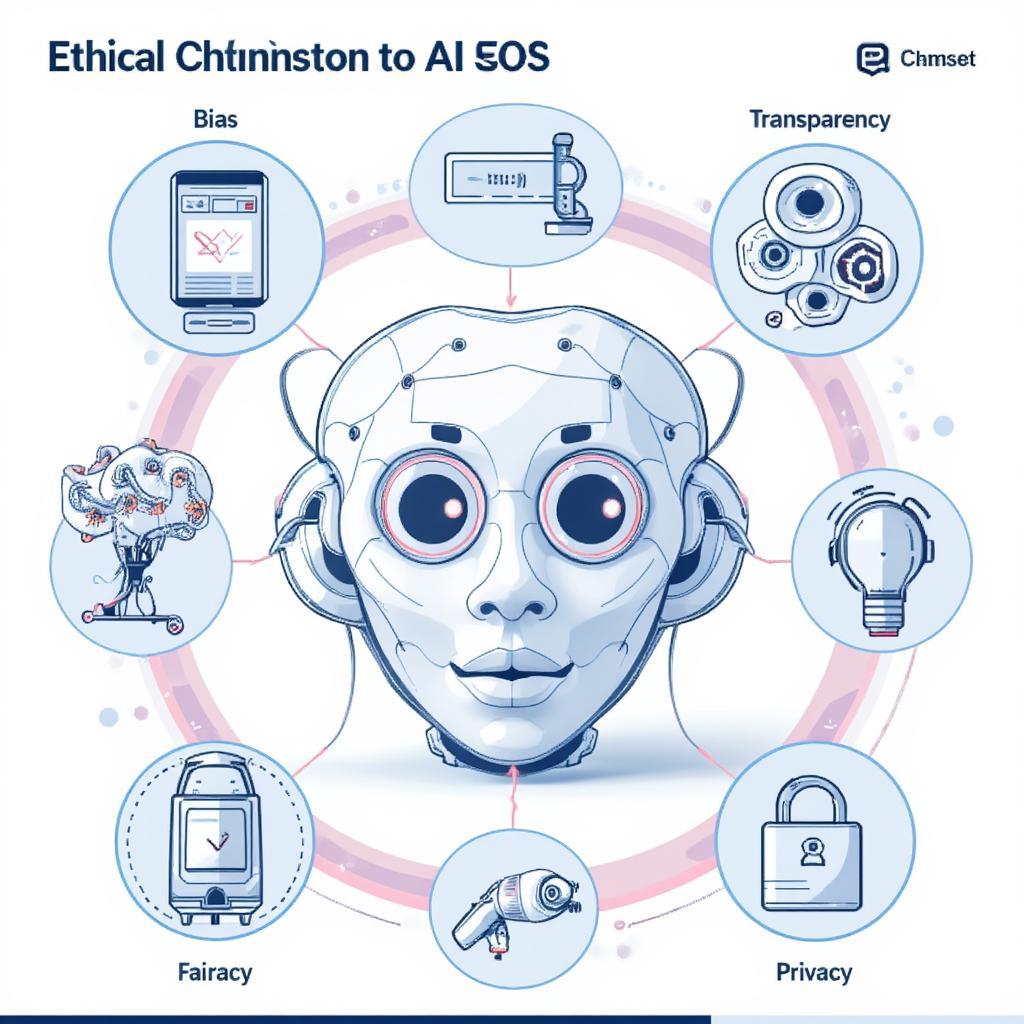Navigating the Ethical Maze of Artificial Intelligence, Machine Learning, and Data Science

The rise of artificial intelligence, machine learning, and data science has been nothing short of transformative, promising unprecedented advancements across various sectors. However, this rapid progress brings forth a crucial question: How do we ensure these powerful technologies are developed and used ethically? The integration of AI into our daily lives necessitates a thorough examination of its implications, not just for technological innovation but also for societal well-being. This article delves into the critical ethical considerations within these fields, aiming to foster a more responsible and human-centered approach to technological advancement.
The intersection of these technologies raises complex dilemmas, from potential biases embedded in algorithms to the impact on employment and privacy. It’s no longer enough to simply marvel at AI’s capabilities; we must actively steer its development towards outcomes that are fair, transparent, and beneficial to all. The challenge lies in balancing innovation with responsibility, and that begins with understanding the specific ethical issues at hand.
Understanding the Core Ethical Dilemmas in AI
When we talk about the ethics of artificial intelligence, machine learning, and data science, what are the specific problems we’re trying to solve? It often boils down to a few key areas. First, there’s the issue of algorithmic bias. Machine learning models learn from data, and if that data reflects existing societal prejudices, the algorithms will perpetuate and amplify those biases. Imagine a hiring algorithm trained on historical data where men held most leadership positions – it might unfairly disadvantage female applicants. Second, we face questions of privacy. Data science, which fuels many AI applications, relies on collecting and analyzing vast amounts of personal information. How do we ensure that this data is handled securely and ethically, without infringing on individual rights?
Third, accountability becomes a tricky issue. When an AI makes a mistake, who is responsible? Is it the programmer, the company that deployed the AI, or the algorithm itself? The lack of transparency in some AI systems can also lead to distrust. When we don’t understand how an AI arrives at a particular decision, it’s difficult to accept it, particularly if it affects us personally. Finally, the long-term impact of AI on the job market is a major concern. As AI automates more tasks, what will be the future of work?
These are not just theoretical concerns; they are pressing challenges that affect our lives today. Addressing them requires a concerted effort from researchers, developers, policymakers, and the public. The very future of AI depends on our ability to weave ethics into every step of its development and application.
How Algorithmic Bias Creeps In
Algorithmic bias isn’t some inherent flaw in the technology itself, but rather a reflection of the data used to train the models. penny stocks for artificial intelligence show that there’s increasing financial interest in AI, underscoring the need for this topic. Consider this example, if a facial recognition system is primarily trained using images of one ethnic group, it might struggle to accurately identify individuals from other ethnicities. This is not a fault of the technology; it’s a flaw in the data selection.
Here’s another practical illustration: imagine an AI system designed to evaluate loan applications. If it’s trained on historical loan data that reflects past discriminatory lending practices, it might unfairly deny loans to individuals from marginalized communities. The impact is profound, perpetuating and potentially amplifying inequalities that already exist in society.
It’s crucial to remember that data is not neutral. It carries the biases and perspectives of those who collected it, and if we’re not careful, our AI systems will inadvertently do the same. Combating algorithmic bias requires a multi-faceted approach, including carefully selecting training data, implementing techniques to detect and mitigate bias, and ensuring that algorithms are regularly audited for fairness.
Privacy Concerns in the Age of Data Science
The immense power of data science comes with a responsibility to handle personal information ethically. Every time we use a website, conduct a search, or use an app, we generate data that can be collected and analyzed. This data is valuable for improving products and services, but the vast amount being collected raises major privacy concerns. How do we ensure that individuals have control over their data and that it isn’t used in ways they didn’t consent to? What safeguards are in place to protect our personal information from being hacked or misused?
Furthermore, there’s the issue of data anonymization. While it’s often possible to remove obvious identifiers like names and addresses, sophisticated techniques are sometimes able to re-identify individuals from supposedly anonymous data. This raises the risk of sensitive information being exposed, despite our best intentions. Ensuring true data privacy goes beyond simple anonymization; it requires a fundamental shift towards data minimization and robust security measures.
Accountability and Transparency: Who’s Responsible When AI Fails?
Accountability is a knotty ethical issue within AI. When an autonomous vehicle has an accident, or a medical diagnostic AI makes an error, who is responsible? Is it the engineer who built the system, the company that deployed it, or the AI itself? The lack of clear answers to these questions creates a lack of public trust.
Moreover, many AI systems, especially those based on deep learning, are considered ‘black boxes’. This means that it’s often difficult to understand how they arrive at their decisions. This lack of transparency makes it hard to audit these systems for bias or to hold them accountable when things go wrong. Developing more explainable AI is a key area of research that could address this problem. But, even with this technology, responsibility still falls on humans.
Expert Insight: “The ethical development of AI requires a holistic approach, taking into account not only the technological possibilities but also the societal implications. We must ensure that AI systems are fair, transparent, and accountable,” says Dr. Eleanor Vance, a leading ethicist specializing in technology.
The Impact of AI on the Future of Work
One of the most prominent anxieties around artificial intelligence, machine learning, and data science is the potential for widespread job displacement. As AI systems become more adept at performing tasks previously done by humans, many worry about their future employment prospects. The rise of automation doesn’t just affect blue-collar jobs; it also impacts professions in sectors such as finance, medicine, and law.
However, it’s not all doom and gloom. It is also likely that new jobs will emerge as AI creates the need for individuals to design, implement and monitor these systems. Furthermore, AI can automate repetitive and dangerous tasks, freeing humans to focus on more creative and rewarding endeavors. The key lies in ensuring that workers have the opportunity to develop the skills needed to navigate this changing landscape. This may include vocational training programs and access to continuous learning. It requires planning and vision to prevent a further chasm between those who benefit from AI and those who are left behind.
Building Ethical AI: Practical Steps Forward
Given the challenges outlined above, what concrete steps can we take to ensure that artificial intelligence, machine learning, and data science are used ethically? First, we need to establish clear ethical guidelines and standards for the development and deployment of AI systems. This is not just the role of governments and large institutions, it also falls on the shoulders of tech companies to be responsible from inception.
Second, we need to focus on education and awareness. It’s important that everyone, not just those in technical fields, understand the ethical implications of AI. This means incorporating ethics into the curricula in schools and universities, and creating public forums where these issues can be discussed.
Third, we need to invest in research that advances our understanding of how to build fairer and more transparent AI systems. This may include developing new methods for mitigating bias in machine learning algorithms and exploring ways to make complex AI decisions more interpretable. And of course, we should never shy away from challenging the status quo.
Key Principles for Ethical AI
Building ethical AI systems isn’t just about avoiding negative outcomes; it’s about actively pursuing positive impacts. Here are a few key principles to guide the development of AI:
- Fairness: AI systems should be designed to be fair and unbiased, with outcomes that are equitable for all groups.
- Transparency: AI systems should be as transparent as possible. When a decision is made by AI, there should be a clear explanation that is understandable to those affected.
- Accountability: There should be clear lines of accountability for AI systems, meaning that someone is responsible when things go wrong.
- Privacy: Personal data should be treated with care, only collected when it is necessary, and protected using rigorous security measures.
- Beneficence: AI systems should be developed with the aim of promoting the well-being of individuals and society as a whole.
These principles are interconnected, not independent. It’s important to remember, when designing AI products, that each is taken into account at every stage.
Strategies for Mitigating Bias in Data
Bias in data is a core cause of many of the ethical problems within AI. Therefore, addressing this bias is crucial. Here are some strategies:
- Careful Data Selection: Choose the data used to train AI algorithms carefully. Ensure it is representative of the broader population and doesn’t contain any obvious biases.
- Data Augmentation: If certain groups are underrepresented in the training data, consider methods to artificially expand the representation.
- Algorithmic Auditing: Implement tools and processes to regularly audit AI systems for bias. This involves testing different scenarios and comparing outputs across different groups.
- Bias Mitigation Techniques: Employ algorithms designed to specifically reduce bias by adjusting the way they learn from data.
These actions are not always straightforward; they often require creativity, technical expertise, and an ethical mindset. What should be clear to everyone, is the fact that these problems cannot be ignored.
Expert Insight: “The real challenge in AI ethics lies not in technological advancement, but in our human capacity to create truly responsible systems. We have to think hard about where our biases lie,” explains Professor Kenji Tanaka, a specialist in AI and moral philosophy.
Promoting Data Privacy and Security
Protecting data privacy is fundamental to the ethical use of artificial intelligence, machine learning, and data science. Here are some strategies for enhancing data security and ensuring privacy:
- Data Minimization: Only collect the data that is absolutely necessary for a given task.
- Data Anonymization: Remove identifiable information from datasets wherever possible, but remember that anonymization techniques need to be very robust.
- Encryption: Encrypt data both while in storage and during transmission to prevent it from being accessed by unauthorized parties.
- Consent: Ensure that users have given explicit consent before their data is collected and used, and provide transparency about how that data will be used.
- Data Governance: Establish clear data governance policies that dictate how data is handled, stored, and shared across different teams and organizations.

These are not simply technical measures. It’s a mindset that has to permeate through all layers of the organization to ensure everyone has a shared understanding of its importance.
Fostering Explainable AI and Accountability
To address the lack of transparency and accountability, there are some important steps that can be taken to develop systems that are more explainable:
- Explainable AI (XAI): Invest in research and develop XAI techniques that are able to articulate why a particular AI system made a particular decision.
- Human-in-the-loop: Ensure that AI systems are not entirely autonomous, instead have a ‘human in the loop’ to provide oversight, especially for situations that have serious consequences.
- Auditing and Review: Implement rigorous processes for auditing and reviewing AI systems. Make sure these systems are being used within the agreed ethical framework.
- Standardized Documentation: Develop documentation standards for AI systems, which include information on the development process, the data that was used, and the limitations of the system.
These are not trivial undertakings. They involve creating new processes and systems within the development community. However, they are absolutely vital to building trust in AI.
Preparing for the Future of Work
The future of work in the age of artificial intelligence, machine learning, and data science is uncertain, but there are some things we can do to help us navigate this transition:
- Education and Training: Invest in educational programs that teach individuals new skills that are relevant to the AI-driven economy.
- Lifelong Learning: Emphasize the importance of lifelong learning. Provide workers with the opportunities to reskill and upskill throughout their careers.
- Support for Displaced Workers: Offer support to those who are displaced by AI through unemployment insurance and other social programs, and provide training opportunities that can help them find new work.
- Collaboration between Government, Industry, and Education: Foster greater collaboration between these three sectors to ensure that our strategies are responsive to changing needs of individuals and industry.
Expert Insight: “The ethical use of AI will be decided by how well we embrace it and plan for its inevitable impact. We will need both technology and ethics working in unison,” says Dr. Anya Sharma, a leading consultant in AI transformation.
These issues are interlinked, and it is only by working together that we will create a future of work that is fair, equitable and accessible for all.
Conclusion: A Call for Ethical Responsibility
The power of artificial intelligence, machine learning, and data science is undeniable. These technologies have the potential to solve some of the biggest challenges facing our world. However, we must acknowledge the ethical challenges these technologies also create and address them with honesty and vigor.
The responsible development and use of AI depends on our ability to be both creative and thoughtful. By embracing the principles of fairness, transparency, accountability, and privacy, we can ensure that these advancements benefit all of humanity. Now is the time to collectively choose a path forward that creates a future where technology serves people, not the other way around. The journey is ongoing, and it requires that we remain vigilant, adaptive, and committed to building a future powered by responsible innovation. The choice is ours.




